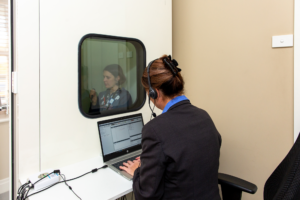What is tinnitus?
Tinnitus is the name given to noises you can hear that come from within your own body. Only you can hear these sounds. You may notice tinnitus noises in your ears or in your head. They can sound like anything at all. Some of the common ways people describe their tinnitus sounds are like ringing or hissing sounds, like cicadas or static noises and sometimes even like musical sounds. The tone and volume of tinnitus sounds often changes. It can sound different from day to day or hour to hour. It might be there all the time or just come and go. Tinnitus is very common and has been experienced to varying degrees by up two thirds of the Australian population at some point in their lives. It is most common in adults but children experience tinnitus as well.
So, where does tinnitus come from?
Tinnitus can be generated from anywhere along your auditory (hearing) pathways. It can be due to your brain detecting movement in your middle ear (this is where the eardrum lives), fluid vibrations in the inner ear or movement of information along your auditory nerve to your brain. The rest of your body often makes noises too – think about your tummy rumbling or your shoulder creaking as you move it in a certain position. Often the other noises your bodies make are louder, so other people can hear them as well, not always though.
Is my tinnitus going to hurt me?
Tinnitus itself cannot physically hurt you. It is just a sound or sounds, and despite it seeming very loud at times for many people, it is not so loud that it will damage your hearing. When you first notice your tinnitus, it is a good idea to have an audiology assessment to check if there is anything causing your tinnitus that may require further investigation. Remembering that it is common for healthy ears and brains to experience tinnitus, there are some things that can cause it to be louder that require treatment or intervention. Things like noise exposure, wax occlusion, middle ear infection and hearing loss commonly cause tinnitus to be more prevalent.
Will my tinnitus ever go away?
When you think about tinnitus as your ears and hearing pathways just going about their business making bodily sounds, it makes sense that it is unlikely to go away altogether, which is okay. It is likely to change over time, however, and amazingly you can turn the volume of your tinnitus right down, so it is just in the background and not bothersome anymore. If you think about how your brain can turn down other noises, it is perfectly reasonable that you can turn down your tinnitus too. Say you move house and there is a busy road beside your house. In the beginning at nighttime you might think, ‘I am never going to be able to sleep with all this noise just outside my bedroom window.’ But, after a few months, you find that you don’t even notice the traffic noise anymore – your brain has turned it down, or ‘tuned it out.’ The same thing happens with tinnitus. Once we accept that it is just a noise in the background that is not going to hurt us, our brains have the capability of turning it right down. So, after a while we don’t even notice it anymore, not unless we listen for it, just like the traffic noise.
So, what should I do about my tinnitus?
Firstly, organise a hearing assessment to check that all is well along your auditory pathways. If the Audiologist has any concerns, they will refer you to your doctor for further investigation. Then, once other causes are ruled out, the Audiologist will discuss ways to help you learn to turn your tinnitus down. In some cases, you may require a further tinnitus counselling appointment and things like the consideration of hearing aids or the use of a tinnitus app.
Remember, don’t despair if your tinnitus is interfering in your life. It is normal for your body, including your ears, to make noises. You can turn it down and if you need help doing this, contact us to arrange an appointment.
For further information and strategies to help turn down your tinnitus we recommend visiting www.seekingbalance.com.au

